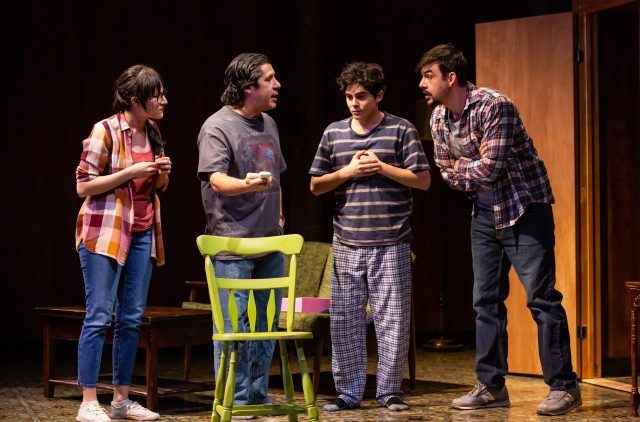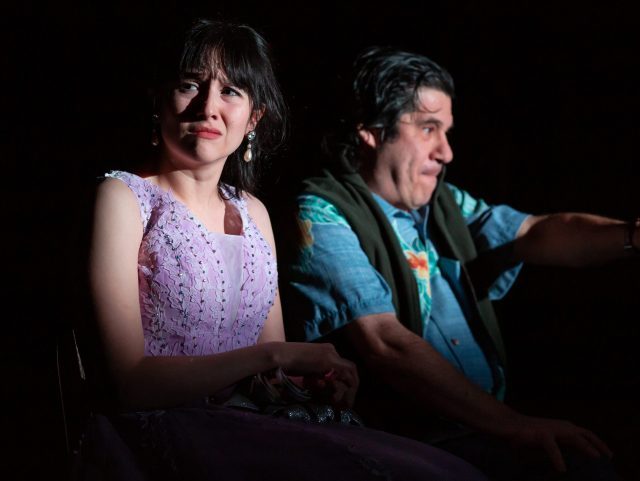
A family bands together after the mother gets deported in timely 72 Miles to Go . . . (photo by Jeremy Daniel)
Laura Pels Theatre
Harold and Miriam Steinberg Center for Theatre
111 West 46th St. between Sixth & Seventh Aves.
Tuesday – Sunday through May 3, $79-$149
212-719-1300
www.roundabouttheatre.org
Hilary Bettis puts a distinctly human face on the immigration crisis in 72 Miles to Go . . . , making its world premiere at Roundabout’s Laura Pels Theatre through May 3. But Bettis and director Jo Bonney don’t turn it into a political screed; instead, the story takes place between 2008 and 2016, before Donald Trump took office and ICE started tearing children away from parents and keeping them in cages. It’s a slice-of-life drama, concentrating on the little things that make up family life on a daily basis.
The show is bookended by the final sermon delivered by retiring Unitarian minister Billy (Triney Sandoval) to his flock in his Tucson church. “I spent months and months working on this sermon, trying to get every word just right. Hoping to leave this congregation I love so deeply with some words that’ll stick with you after I’m gone. But I’m standing here now, and none of those words feel right,” he says, adding after a pause, “That was a bit dramatic, but I couldn’t resist the theatrics of it.” It’s a poignant comment that not only sets the stage for the story but relates to Bettis’s process, which involves constant rewriting; at a recent talkback, she admitted making significant changes throughout the preview process, including to the opening sermon just a few days before I saw the play.

Eva (Jacqueline Guillén) and her father (Triney Sandoval) soldier on after her mother’s deportation in Roundabout world premiere by Hillary Bettis (photo by Jeremy Daniel)
Billy lives with his three children, fourteen-year-old Aaron (Tyler Alvarez), a science lover who is entering high school; seventeen-year-old Eva (Jacqueline Guillén), who is preparing her valedictorian speech for her high school graduation, and twenty-three-year-old Christian (Bobby Moreno), an undocumented immigrant who is having trouble finding a job because he has no papers. Billy’s wife, Anita (Maria Elena Ramirez), has been deported and is in Nogales, Mexico, seventy-two miles away; Billy rescued Anita and Christian, who were both born in Mexico, when he found them in the desert, escaping their dangerous country for a new life in America. Billy and the kids communicate with Anita via cellphone as she tries to obtain legal status to return to the United States and Christian applies for the DACA program, ever on edge that he will be caught and deported at any moment. They are all dreamers in the midst of a nightmare. “I can’t sleep,” Aaron tells his sister. “I dreamed there was this huge flood and it poured into our house and no one could swim except me, but I couldn’t hold you and Dad and Mom and Christian and then we all drown.”
Rachel Hauck’s set is a standard-issue kitchen and living room, except the back wall is like a huge border with sky seen in the distance, as if they’re trapped from that outside world, large telephone poles a reminder of the only way they can remain in contact with Anita. Billy, Christian, Eva, and Aaron all make compromises and, at times, dangerous choices in order to get Anita back and live again as a complete family, free from the panic and dread that hover over them. Bettis (Alligator, The Americans), whose father is a minister and whose mother comes from Tucson, writes incisive, perceptive dialogue and Bonney (Cost of Living, Father Comes Home from the Wars) is a smart, wily director, but Bettis’s recurrent revisions might be why a few scenes still feel unfinished. Sandoval (The Thin Place, A Free Man of Color) leads a strong cast, emphasizing Billy’s essentially easygoing nature (and penchant for bad jokes) as he struggles to put his family back together and live without fear, his heart obviously aching. “The older I get, the more I realize that it’s not the grand events that give our lives meaning and purpose. It’s the small everyday moments we take for granted,” he says in his sermon. And that’s not too much to ask for.